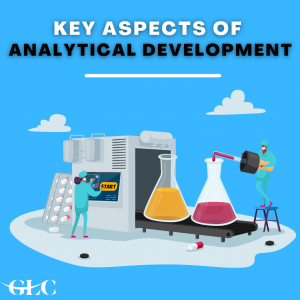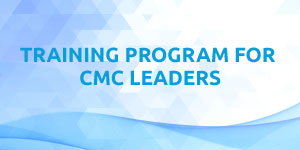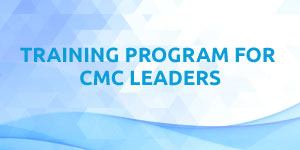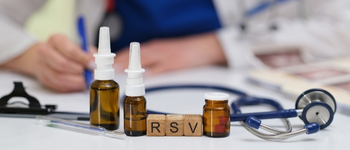Free knowledge to monitor the world of events. Have a look at our must read Blogs on Pharma, Finance, HR, Health and Cross Industry.
Key Aspects of Analytical Development
2022-08-16
Key Aspects of Analytical Development
The advancement of analytical techniques plays a pivotal role in the pharmaceutical sector, particularly in the domains of drug discovery and manufacture. The scope of this endeavor is the systematic progression and verification of analytical methodologies to ascertain the authenticity, integrity, and efficacy of pharmaceutical substances. This blog post aims to examine the fundamental procedures,
methodologies, and factors associated with analytical progress.

Introduction
Analytical development plays a vital function within the pharmaceutical sector since it is responsible for guaranteeing the quality, safety, and effectiveness of pharmaceutical products. The process encompasses the advancement, refinement, authentication, and dissemination of analytical techniques employed for the examination of pharmaceutical substances and products. Pharmaceutical firms can effectively ascertain the composition, purity, and potency of their products through the utilization of diverse analytical procedures.
The Importance of Analytical Development
The cultivation of analytical development holds significance for biotechnology enterprises engaged in the execution of preliminary-stage clinical studies. The efficacy of a pharmaceutical development program is heavily contingent upon the caliber of the medicine. Hence, the development of robust and dependable analytical techniques is crucial for evaluating the quality features of pharmaceuticals. Regulatory bodies mandate the implementation of analytical technique development and validation for both clinical trial applications and marketing authorizations.
Additionally, ensuring patient safety is of utmost importance in the field of pharmaceutical research and development. The direct influence of patient safety is contingent upon the development and manufacturing quality of a drug. The utilization of accurate and exact analytical procedures plays a crucial role in safeguarding the safety and effectiveness of medications supplied to patients.
Analytical Method Development: An Overview
The process of analytical method development encompasses a sequence of activities that are undertaken to create and validate test techniques that can be utilized to facilitate the various stages of drug discovery. The aforementioned methodologies undergo evolution during the drug development timeline, commencing from the initial stages of discovery and persisting until the last stages of commercial manufacture.
The main aim of the creation of analytical methods is to determine the essential quality characteristics of the pharmaceutical product and create a strategy to guarantee the drug substance or composition's identification, purity, and potency. The aforementioned procedure encompasses the identification of appropriate testing methodologies, the assurance of adherence to regulatory requirements, and the validation of the methods' appropriateness for their intended objectives.
Characterization and Selection of Analytical Methods
The initial stage in the development of an analytical method involves the comprehensive characterization of the medicinal substance. The process entails evaluating the existence of contaminants, encompassing both organic and inorganic impurities, residual solvents, elemental impurities, and water content. Furthermore, an assessment of solubility and stability properties is conducted in this stage.
The commencement of the selection process for suitable analytical methods follows the characterization of the drug substance. The selection procedure encompasses a comprehensive examination of relevant literature, utilisation of prior experimental resources, and careful consideration of the specific requirements associated with the medicine in question. The selection of methods should be appropriate, consistent with the desired purpose, and adequately resilient. During the selection process, it is important to take into account parameters like accuracy, precision, specificity, and limits of quantitation and detection.
Optimization and Validation of Analytical Methods
Following the selection of analytical methods, the optimization step commences. This process entails the identification and configuration of laboratory equipment to attain the highest level of performance. The parameters of specificity, sensitivity, linearity, range, and stability undergo thorough examination and optimization. The objective is to devise methodologies that yield precise and dependable outcomes.
After the optimization of the procedures, the validation phase begins. Validation is a thorough and all-encompassing process that serves to establish the suitability of analytical processes for their intended purpose. The process entails the execution of experiments to assess the performance characteristics of the methods, encompassing specificity, limit of detection, limit of quantitation, accuracy, precision, and stability.
Parameters in Drug Analytical Testing
In the context of drug analysis, it is imperative to take into account many criteria to guarantee the precision and dependability of the obtained results. The parameters encompassed in this set are specificity, limit of detection, limit of quantitation, linearity, accuracy, range, precision, and stability.
The concept of specificity pertains to the capacity of a given method to precisely and accurately measure the analyte of interest while minimizing any potential interference from other components within the system. The limit of detection refers to the minimum concentration of the analyte that can be accurately and consistently detected. The limit of quantitation refers to the minimum concentration of the analyte that can be precisely determined.
Linearity pertains to the correlation between the concentration of the analyte and the response exhibited by the analytical procedure. The concept of accuracy pertains to the degree of proximity between a measured value and the true value, whereas precision evaluates the capacity of a procedure to consistently produce similar results.
Stability is a vital parameter within the realm of drug analytical testing. The implementation of this approach guarantees the maintenance of reliability and consistency throughout an extended period. Regular monitoring of the method's performance, coupled with the implementation of system suitability tests and quality control checks, is necessary to ascertain its suitability for the intended purpose over its entire lifespan.
Lifecycle of an Analytical Method
The initiation of the lifespan of an analytical technique commences with the acknowledgment of a necessity for a novel method or the discernment of an already existing approach that is appropriate for a particular objective. The development phase includes the process of refining the methodology and establishing a comprehensive validation strategy. After the development of a method, validation experiments are conducted to ascertain the method's appropriateness for its designated objective.
After the validation of the approach, standard operating procedures (SOPs) are established for regular implementation. Continuous monitoring of the method's suitability for its intended purpose is vital, and revalidation may be required in the event of modifications to the drug substance manufacturing, drug product composition, or the analytical procedure.
Analytical Method Transfer
Analytical method transfer refers to the process of validating a laboratory's capability to adopt and implement an analytical test procedure that was initially developed and employed at a different laboratory. This assures that the laboratory receiving the method possesses the necessary knowledge and skill to execute the analytical procedure per its intended purpose.
Transfer studies commonly entail the implementation of pre-authorized transfer protocols by many laboratories. The aforementioned protocols delineate the specific parameters that are to be assessed and the corresponding acceptance criteria that are to be employed in the evaluation of the outcomes. The effective transfer of analytical methodologies facilitates the maintenance of uniformity and dependability in drug analysis across diverse laboratory settings.
Regulatory Guidelines for Analytical Method Development
The development and validation of analytical methods should conform to internationally recognized guidelines, such as those issued by reputable organizations like the International Council for Harmonisation of Technical Requirements for Pharmaceuticals for Human Use (ICH), the US Food and Drug Administration (FDA), and the European Medicines Agency (EMA).
This document offers extensive information on the validation of analytical techniques, the qualification of analytical instruments, and the documentation requirements for chemical and pharmaceutical quality on experimental medicinal products in clinical trials. Adherence to these principles is of utmost importance in acquiring regulatory approvals and guaranteeing the safety and effectiveness of pharmaceuticals.
The significance of analytical development in the pharmaceutical business cannot be overstated, as it plays a crucial role in guaranteeing the safety, effectiveness, and quality of pharmaceuticals and medical products. The following are empirical instances that underscore the importance of analytical advancement within the pharmaceutical industry:
- Drug Formulation and Quality Control: Pharmaceutical companies are required to conduct thorough analyses of the composition of drug formulations to verify compliance with established quality standards. One illustrative instance is the utilization of an analytical methodology to ascertain the concentration of the active ingredient in a pharmaceutical product, thereby mitigating the risks associated with inadequate or excessive dosing that may pose harm to patients.
- Method Development for Generic Drugs: Analytical development plays a crucial role in the replication of brand-name medications by generic drug makers since it facilitates the creation of procedures that effectively establish bioequivalence. The attainment of regulatory approval and the establishment of patient trust in generic pharmaceuticals as viable and reliable alternatives are of utmost importance.
- Counterfeit Medication Detection: The utilization of analytical techniques is employed in the identification of counterfeit pharmaceuticals, which can potentially jeopardize the well-being of individuals. Through the examination of the chemical makeup of potentially illicit pharmaceuticals, regulatory bodies, and pharmaceutical enterprises can identify and subsequently eliminate counterfeit medicines from circulation within the market.
- Biopharmaceuticals and Biosimilars: The cultivation of analytical skills plays a crucial role in the advancement of biopharmaceuticals and biosimilars. The assurance of both structural and functional resemblance between biosimilars and the reference biologic product is contingent upon the utilization of sophisticated analytical methodologies, including mass spectrometry and biophysical analysis.
- Stability Testing: Pharmaceuticals must maintain their stability during their designated period of storage. The process of analytical development encompasses stability testing, which involves the analysis of pharmaceuticals under different settings to ascertain their degradation patterns and determine their shelf life. This practice guarantees that drugs maintain their effectiveness and do not develop adverse effects as time progresses.
- Impurity Profiling: Impurities are frequently present in pharmaceuticals, and their presence can be attributed to either the manufacturing process or storage conditions. Analytical development plays a crucial role in the identification and quantification of impurities, so ensuring their compliance with accepted thresholds and mitigating potential dangers to patients.
These instances highlight the significant importance of analytical development in the pharmaceutical sector. The assurance of both the safety and effectiveness of medications is not the sole purpose of this process, but it also serves to support the advancement and ongoing enhancement of pharmaceuticals that have the potential to save lives and improve public health.
Conclusion
The process of analytical development holds significant importance within the pharmaceutical sector, specifically in the realms of drug research and production. The establishment of appropriate procedures for method creation, optimization, validation, and transfer is of utmost importance in guaranteeing the quality, safety, and effectiveness of pharmaceuticals.
Pharmaceutical businesses can establish robust and reliable analytical procedures by diligently adhering to regulatory rules and meticulously following the steps provided in this detailed guide. The selection of a proficient collaborator for the creation of analytical methods can significantly augment the efficacy of drug development initiatives.
The field of analytical development is subject to ongoing evolution because of technological improvements and the need to comply with regulatory criteria. Remaining current with the most recent advancements and optimal methodologies in analytical development is vital for achieving success within the pharmaceutical sector.
Join our upcoming Masterclass on Key Aspects of Analytical Development conducted by industry expert.
By Sasly Ahmeth, Social Media Executive & IT Support, GLC Europe, Colombo Office, Sri Lanka.
Get a feel for our events

Training Program for CMC Leaders - EU edition
14th September 2026 - 09th April 2027
Rich with practical insights and real-world applications
learn more >>
Training Program for CMC Leaders - US edition
14th September 2026 - 09th April 2027
Rich with practical insights and real-world applications
learn more >>
Pediatric Drug Development MasterClass - US edition
17-19 February, 2026
FDA and EMA pediatric decisions
learn more >>












